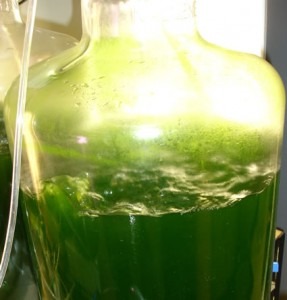 Algae Genomics for Biofuels have the objective to develop algae strains and technology adapted to local conditions, aiming to create a sustainable non-food based crop bioenergy industry.
Algae Genomics for Biofuels have the objective to develop algae strains and technology adapted to local conditions, aiming to create a sustainable non-food based crop bioenergy industry.
Algae Genomics for Biofuels studies can:
a) elucidate mechanisms that regulate the lipid metabolism of algae and carbon dynamics under different environmental conditions.
b) Be employed to manipulate or choose species for bigh lipid yield as well as high biomass production; and c) be utilized to aid large scale farming and processing of algal species.
Algae typically synthesize so called ‘reserve polymers’ as a result of photosynthesis. These reserve polymers can range from starch and starch derivatives to lipids depending on the algal species and the growth conditions.
When grown in photo-bioreactors (PBRs) and open ponds under the right conditions, algae can be used, or designed to be used, for the efficient production of bioethanol (through sugar/starch fermentation) or biojetfuel/biodiesel (from lipids).
Algae have the major advantage over plants that they grow year round (depending on temperature tolerance) and have relatively short generation times. Algae require raw materials that are abundant and inexpensive: sunlight, water, carbon dioxide (flue gas for example) and nutrients (P and N). Some algae have lipid content of up to 70% by weight, others up to 86% of starch by weight.
In addition, algae can grow (or be adapted) in adverse conditions like deserts and saline and/or brackish water. It is critical to have species that are optimized for biomass production while yielding optimum amounts of lipid and/or sugar for biofuel production.
Member of American Aquabiotech, Biofuels Revolution, Moura Enterprises and MyBeloJardim (ver. Portuguese) Prof. Aecio D’Silva’s Group



I am a chemistry professor.I am a researcher in algae fuel. Need references in algae fuel extraction from marine macro algae.
We stand always by Israel and long to visit Israel.